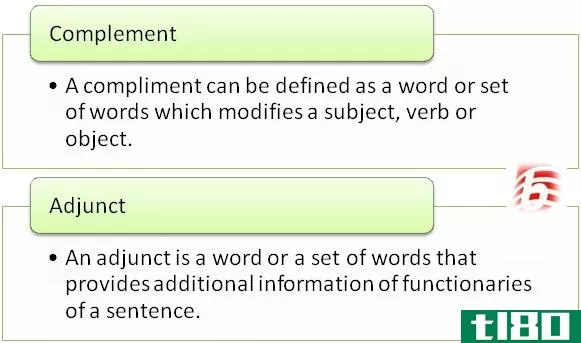语法补语
在语法中,补语是完成句子中谓语的单词或词组。与修饰语(可选)不同,补语是用来完成句子或句子的一部分意思的。

下面你会发现关于两种常见补语类型的讨论:主语补语(跟在动词be和其他连接动词后面)和宾语补语(跟在直接宾语后面)。正如David Crystal在《语言学和语音学词典》中所指出的:
"[T]he domain of complementation remains an unclear area in linguistic analysis, and there are several unresolved issues."主题补充例子
这些是主语补语的例子。在本节和后续章节中,补语以斜体列出。
- 我的制服又破又脏。
- 我的制服是T恤和牛仔裤。
- “想象力是对抗现实的唯一武器。——朱尔斯·德·高蒂埃
- “爱是一支爆炸的雪茄,我们愿意抽。”——琳达·巴里
对象补充示例
- 吉米的老师说他是个捣蛋鬼。
- 老师的话使我生气。
- “寡妇为我哭泣,称我为一只可怜的迷途羔羊,她还叫了我许多其他的名字。”——马克·吐温,《哈克贝利·费恩历险记》
主题补充说明
"Subject complements rename or describe the subjects of sentences. In other words, they complement the subjects. "Many of these complements are nouns, pronouns, or other nominals that rename or provide additional information about the subject of the sentence. They always follow linking verbs. A less contemporary term for a noun, pronoun, or other nominal used as a subject complement is predicate nominative.- 他是老板。
- 南希是赢家。
- 这就是她。
- 我的朋友是他们。
- 我的同事很友好。
- 这个故事令人兴奋。
——迈克尔·斯特伦普和奥里尔·道格拉斯,《语法圣经》,亨利·霍尔特,2004年
宾语补语
"An object complement always follows the direct object and either renames or describes the direct object. Consider this sentence:- 她给婴儿取名为布鲁斯。
–Barbara Goldstein、Jack Waugh和Karen Linsky,“语法:如何工作以及如何使用”,第四版,Wadsworth,2013年
"The object complement characterizes the object in the same way as the subject complement characterizes the subject: it identifies, describes, or locates the object (as in We chose Bill as group leader, We consider him a fool, She laid the baby in the crib), expressing either its current state or resulting state (as in They found him in the kitchen vs. She made him angry). It is not possible to delete the object complement without either radically changing the meaning of the sentence (e.g. She called him an idiot - She called him) or making the sentence ungrammatical (e.g. He locked his keys in his office - *He locked his keys). Note that be or some other copula verb can often be inserted between the direct object and the object complement (e.g. I consider him to be a fool, We chose Bill to be group leader, They found him to be in the kitchen)."–Laurel J.Brinton和Donna M.Brinton,现代英语的语言结构。约翰·本贾明斯,2010
“补语”的多重意义
"Complement is one of the most confusing terms in scientific grammar. Even in one grammar, that of Quirk et al. (1985), we can find it being used in two ways: a) as one of the five so-called 'clause elements' (1985: 728), (alongside subject, verb, object and adverbial): (20) My glass is empty. (subject complement) (21) We find them very pleasant. (object complement) b) as a part of a prepositional phrase, the part that follows the preposition (1985: 657): (22) on the table "In other grammars, this second meaning is extended to other phrases....It therefore appears to have very broad reference, to anything that is needed to complete the meaning of some other linguistic unit... "These two basic meanings of complement are neatly discussed in Swan [see below]."–Roger Berry,“英语教学中的术语:性质和使用”,Peter Lang,2010)
"The word 'complement' is also used in a wider sense. We often need to add something to a verb, noun, or adjective to complete its meaning. If somebody says I want, we expect to hear what he or she wants; the words the need obviously don't make sense alone; after hearing I'm interested, we may need to be told what the speaker is interested in. Words and expressions which 'complete' the meaning of a verb, noun, or adjective are also called 'complements.' "Many verbs can be followed by noun complements or -ing forms with no preposition ('direct objects'). But nouns and adjectives normally need prepositions to join them to noun or -ing form complements."–Michael Swan,“实用英语用法”,牛津大学出版社,1995年)
- 我想喝一杯,然后我想回家。
- 她明白保密的必要性吗?
- 我对学习飞行感兴趣。
词源来自拉丁语“to fill”
发音:KOM pliment
- 发表于 2021-10-08 22:55
- 阅读 ( 202 )
- 分类:语言
你可能感兴趣的文章
主语补语(subject complement)和直接对象(direct object)的区别
...主语补语与直接宾语 主语补语和直接宾语是句子的两个语法元素,它遵循句子的主谓。一些英语学习者由于其位置相似,很难区分主语补语和直接宾语的区别。主语补语与直接宾语的主要区别在于主语补语遵循一个连接动词,...
- 发布于 2020-10-21 23:15
- 阅读 ( 447 )
辅助(adjunct)和补足(complement)的区别
...组词。补语赋予句子意义,如果去掉补语,则会使句子在语法上不准确。因此,这些对于一个句子来说是必要的,因为没有它,句子就不能向读者传达意义。注意下面给出的例子。 克拉拉是个音乐家。 在这个句子中,“Clara是...
- 发布于 2020-10-29 17:15
- 阅读 ( 580 )
补体(complement)和状语(adverbial)的区别
...词的额外信息。恭维是谓语的一个片段,没有它,句子在语法上就不完整,没有意义。另一方面,状语是提供有关动词或主语的额外信息的短语。状语的出现可能会改变句子的意思,然而,状语短语的缺失并不会使句子失去意义...
- 发布于 2021-07-09 12:12
- 阅读 ( 318 )
补体(complement)和否定(negation)的区别
...音频和视频,而是用来描述一种特殊感觉的词语。在英语语法中,我们称这些词或词组为“补语”,没有补语,句子或语句就不完整。我们确实知道这样一个事实,一组积极的词一起可以创造一个积极的陈述,同样的,一组消极...
- 发布于 2021-07-09 12:15
- 阅读 ( 312 )
“那”条款
在英语语法中,“that”-从句是通常以that开头的从句。也称为声明性内容子句或“that”-补语子句。 名词性从句在陈述句中可以充当主语、宾语、补语或同位语的名词性从句。Chacker和Weiner指出,以that开头的关系从句(例如,...
- 发布于 2021-09-17 02:05
- 阅读 ( 182 )
动名词:也是名词的特殊动词
...词,用作名词。形容词:动名词或动名词。动名词在传统语法中使用,但许多当代语言学家更喜欢使用-ing形式。 动名词及其宾语、补语和/或修饰语称为动名词短语或名词短语。与名词一样,动名词和动名词短语也可以在句子...
- 发布于 2021-09-24 01:46
- 阅读 ( 267 )
英语语法中的补语定义与举例
...补充一词的由来 “在19世纪末,“补充”一词逐渐进入语法描述和其他语言作品(奥斯托夫1899;托马斯1899:79)。在语法中,它可能是由前面关于有缺陷的范例的概念触发的;例如,如果一个动词在某个类别中缺少形式,则由其...
- 发布于 2021-09-24 21:34
- 阅读 ( 231 )
英语语法中wh-从句的理解
在英语语法中,“wh”-从句是由一个wh词(what、who、which、when、where、why、how)引入的从句。Wh从句可以充当主语、宾语或补语。 Geoffrey Leech指出,“wh子句的一个重要方面是,它们要求将wh元素放在子句的开头,即使这意味着...
- 发布于 2021-09-24 21:57
- 阅读 ( 237 )
语法研究中使用的100个关键术语
本书提供了对传统英语语法研究中使用的基本术语的快速回顾。要更详细地检查这里介绍的单词形式和句子结构,请单击任何术语访问词汇表页面,在那里您将找到大量示例和展开的讨论。 抽象名词 命名一个想法、事件、...
- 发布于 2021-09-25 03:28
- 阅读 ( 224 )
什么是连接动词?(linking verbs?)
...一个连接动词就是。”(威廉·萨菲尔,《如何不写作:语法的基本错误规则》,W.W.诺顿,2005) “我成为了一名女权主义者,以替代成为受虐狂。”(萨莉·肯普顿) 连接动词的两个测试 判断一个动词是否是连动动词的一...
- 发布于 2021-09-25 09:16
- 阅读 ( 388 )















